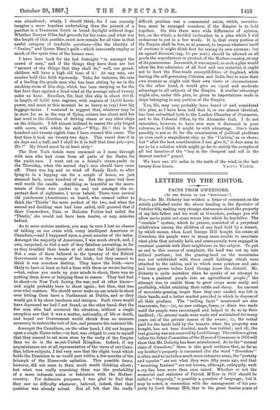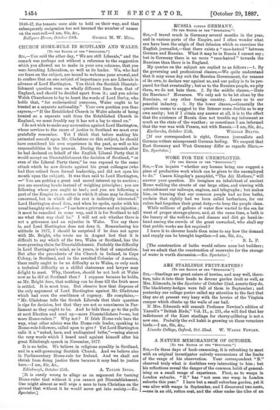LETTERS TO THE EDITOR.
FACTS FROM GWEEDORE.
[To THS EDITO1 Or 281 SPECTATOR...1 Sin,—As Mr. Doherty has written a letter of comment on the article published under the above heading in the Spectator of October 8th, making very strange statements about the property of my late father and his work at Gweedore, perhaps you will allow me to point out some errors into which he has fallen. The " rundale " system, which he praises, consisted of a perpetual subdivision among the children of any land held by a tenant, by which means, when Lord George Hill bought his estate at Gweedore, the people were in many cases unable to ascertain what plots they actually held, and consequently were engaged in constant quarrels with their neighbours on the subject. To put an end to this source of complaint, the land was cat up into defined portions ; but the grazing-land on the "mountains was not subdivided with these small holdings which were attached to the cabins, and in which some potatoes and oats had been grown before Lord George knew the district. Mr. Doherty is quite mistaken when he speaks of an attempt to " turn a pastoral people into an agricultural people ;" the attempt was to enable them to grow crops more easily and profitably, whilst retaining their cattle and sheep. An amount of mountain-grazing, larger than they ever needed, was left in their hands, and a better market provided in which to dispose of all their produce. The "trifling facts" mentioned are also inaccurate, for,—(a), no new cottage, fence, or drain was made until the people were encouraged and helped to do so by their landlord ; (b), several roads were made and maintained for many years out of the private means of the owner ; (c), the rental paid for the lands held by the tenants when the property was bought, has not been doubled, much less trebled ; and (d), the best grazing was not reserved by Lord George. The evidence given before the Select Committee of the House of Commons in 1858 will show that Mr. Doherty has been misinformed. As to the "normal state of Gweedore," there is also good evidence that, as far as my brother's property is concerned (for the word "Gweedore" is often used to include a much more extensive area), the "poverty and squalor" are not what they were fifty years ago, and that " recurring famines" are not known, although, unhappily, such a cry has been more than once raised. Whether or not the memorial and statistic, of Patrick M'Kye in 1837 should be called a "rhapsody," is possibly a question of language; but it may be noted, in connection with the management of his pro- perty by Lord George Hill, that in the great famine years of 1846-47, the tenants were able to hold on their way, and that subsequently emigration has not lessened the number of names on the rent-roll.—I am, Sir, &c.,



































 Previous page
Previous page